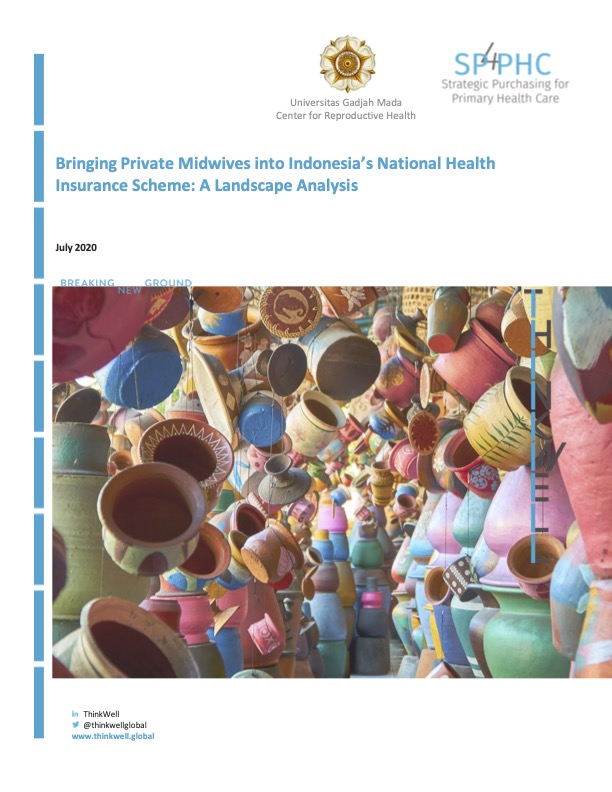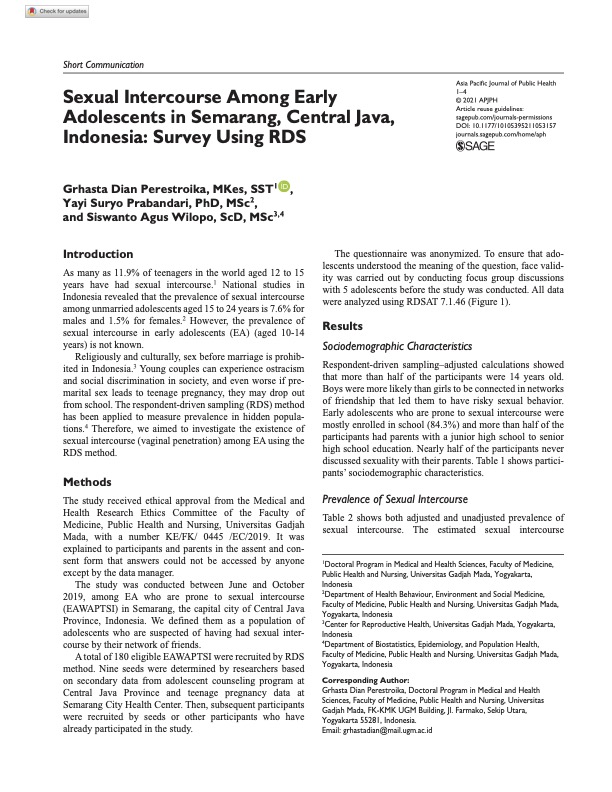
Siswanto Agus Wilopo, Rosalia Kurniawati Harisaputra, Anggriyani Wahyu Pinandari, Althaf Setyawan, Yufan Putri
Bringing Private Midwives into Indonesia’s National Health Insurance Scheme: A Landscape Analysis
- Laporan
Indonesia suffers from stubbornly high maternal mortality. Addressing this challenge is a key priority for the government. Private midwives provide a substantial proportion of reproductive and maternal services across the country. However, very few of these midwives are contracted under Indonesia’s national health insurance scheme, Jaminan Kesehatan Nasional (JKN). On the one hand, a sizeable proportion of women pay out-of-pocket (OOP) for maternal services at varying levels of quality from private midwives, while on the other an increasing proportion of JKN claims are for expensive services, including caesarean sections (C-sections). Integrating this widely accepted frontline provider of maternal services into JKN could have equity, efficiency, and quality benefits.
This report summarizes findings from a landscaping study that ThinkWell and the Center for Reproductive Health at Universitas Gadjah Mada undertook in 2018 on JKN engagement with private midwives under the Strategic Purchasing for Primary Health Care (SP4PHC) project. ThinkWell is implementing SP4PHC in partnership with government agencies and research institutions in five countries, with support from a grant from the Bill & Melinda Gates Foundation. The project’s overarching objective is to strengthen how governments purchase primary health care (PHC) services, with a focus on family planning (FP) and maternal, newborn, and child health (MNCH). The team completed a detailed policy review, data analysis, and qualitative interviews to explore why private midwives are not participating in JKN and to generate recommendations about how these underlying factors may be addressed. This information has informed ongoing discussions about improving strategic purchasing for MNCH, which the Ministry of Health (MOH) is leading with key Indonesian stakeholders and partners to ultimately develop and test policies that offer a stronger value proposition to private midwives to participate in JKN.
A detailed review of JKN processes relating to contracting providers and processing claims reveals the complexity and inefficiency of current systems and how these differ by level and provider type. A major reason why a low proportion of private midwives have joined JKN is the uncertainty of getting reimbursed for services. Private midwives must submit claims through local PHC facilities, which adds another layer of bureaucracy that slows down the overall payment process. Also, the reimbursement rates for MNCH services through JKN are low compared to the OOP fees pregnant women are willing to pay private midwives. The current payment system does not show the benefits of joining JKN for private midwives.
While there is an abundant supply of midwives across Indonesia, there is wide variation in the training, certification, and competencies of midwives. Although there are over 700 schools that provide midwifery training, many are not accredited, and there are wide variations in training standards. Additionally, the administrative burden associated with regulating the licensing of private midwives falls onto overburdened local health officials. Government officials hesitate to include private midwives into JKN because they are unable to adequately monitor and ensure the quality of their service delivery.
Addressing these pain points will allow the MOH and other key stakeholders to develop and test policies that offer a stronger value proposition to private midwives to participate in JKN, with support from SP4PHC and other partners. Once private midwives have joined, the purchasing power of JKN can be leveraged to strategically incentivize better-quality practices from this trusted cadre of providers, widen JKN’s effective coverage, and reorient the referral and delivery system more toward PHC and away from more costly upstream services.




